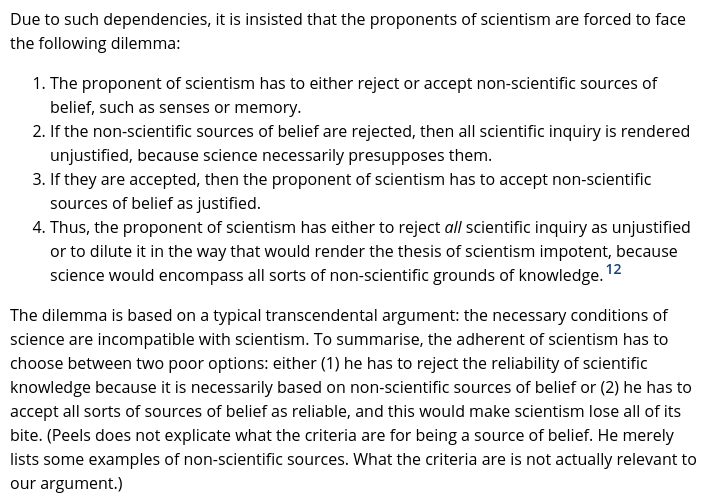when in reality, science is still in its relative infancy?
Much like your age, science only increases. Unless we're dealing with an unrelated loss of physical records, which I'm sidestepping here.
Just like you are now the oldest you've ever been, science is now the most expansive it's ever been. This statement will remain true at all point in time where you (and/or science) exist.
Furthermore, things that science has not yet expanded into fall into a Dunning-Kruger-like gap, where we inherently don't understand the things that science does not yet rigorously cover, by the very definition of what it means to for science to rigorously cover something.
What I find particularly troubling is the authority that science has seemingly acquired—the belief that it can eventually explain everything.
Breaking down this assumption into its constituent components:
- Science is only going up.
- There is a finite amount of things in existence.
- We have no evidence of a glass ceiling that science will reach before it covers everything in existence.
Acting imprecisely (as humans do), these three facts, all individually correct, do seem to lead to the conclusion that science will eventually cover everything in existence.
The issue here is that the third bullet point is trying to prove a negative. This is where the imprecision comes from. If we were to conclusively prove that there is no such ceiling, then the conclusion that science will eventually cover everything (or at least is able to, even if we do not do so) is relatively correct.
So, the core of your question here is asking us to conclusively prove whether such a ceiling exists or not. The unsatisfying answer here is the one listed in the bullet point: we have no conclusive proof of it existing.
Yet, it seems possible that certain truths may exist that science is inherently unable to validate.
This is effectively just stating that it's still possible the glass ceiling exists, even if we don't conclusively know about it yet. That's correct, but it's anyone's guess at this point.
Why, then, is there a prevalent perception that truth must always align with scientific verification?
This question jumps from a logical thesis to a psychological one, which plays by very different rules.
The short answer is: because perception is skewed by bias, and Dunning-Kruger leads people to wrongly believe that absence of evidence is evidence of absence.
Logically, this is not sound. However, in day to day life, these kinds of logical leaps are common when they indicate a heightened statistical probability.
From the perspective of humans in natural evolution, it wouldn't make sense for our minds to refuse to engage in an action before we rigorously prove that it's universally and empirically ironclad. Instead, our brains operate on more of a "monkey has an idea, monkey acts on idea" basis. Coupling that with a tendency to engage more frequently in things that have historically panned out, this leads to humans (and other creatures) to invest their belief into things that might not be rigorously and conclusively proven, but seem to have statistically panned out so far.
From a logical perspective, it's pointless trying to divine why people believe something, at least in the pursuit of establishing actual universal truths. Opinions are not rooted in reality, nor can they only exist in a rigorously enforced framework; making them unconstrained by the constraints of reality.

